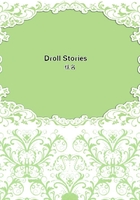
第89章
She kept on talking the round of the garden, which was long, and then arranged with the Innocent that, night come, he should sally forth from his room and get into hers, where she engaged to render him more learned than ever was his father. And the husband was well content, and thanked Madame d'Amboise, begging her to say nothing of this arrangement.
During this time the good old Braguelongne had been growling and saying to himself, "Old ha, ha! old ho, ho! May the plague take thee! may a cancer eat thee!--worthless old currycomb! old slipper, too big for the foot! old arquebus! ten year old codfish! old spider that spins no more! old death with open eyes! old devil's cradle! vile lantern of an old town-crier too! Old wretch whose look kills! old moustache of an old theriacler! old wretch to make dead men weep! old organ-pedal! old sheath with a hundred knives! old church porch, worn out by the knees! old poor-box in which everyone has dropped. I'll give all my future to be quit of thee!" As he finished these gentle thoughts the pretty bride, who was thinking of her young husband's great sorrow at not knowing the particulars of that essential item of marriage, and not having the slightest idea what it was, thought to save him much tribulation, shame, and labour by instructing herself.
And she counted upon much astonishing and rejoicing him the next night when she should say to him, teaching him his duty, "That's the thing my love!" Brought up in great respect of old people by her dear dowager, she thought of inquiring of this good man in her sweetest manner to distil for her the sweet mysteries of the commerce. Now, the lord of Braguelongne, ashamed of being lost in sad contemplation of this evening's work, and of saying nothing to his gay companion, put this summary interrogation to the fair bride--"If she was not happy with so good a young husband--"
"He is very good," said she.
"Too good, perhaps," said the lieutenant smiling.
To be brief, matters were so well arranged between them that the Lord engaged to spare no pains to enlighten the understanding of Madame d'Amboise's daughter-in-law, who promised to come and study her lesson in his room. The said lady d'Amboise pretended after supper to play terrible music in a high key to Monsieur Braguelongne saying that he had no gratitude for the blessings she had brought him--her position, her wealth, her fidelity, etc. In fact, she talked for half an hour without having exhausted a quarter of her ire. From this a hundred knives were drawn between them, but they kept the sheaths. Meanwhile the spouses in bed were arranging to themselves how to get away, in order to please each other. Then the innocent began to say he fell quite giddy, he knew not from what, and wanted to go into the open air. And his maiden wife told him to take a stroll in the moonlight.
And then the good fellow began to pity his wife in being left alone a moment. At her desire, both of them at different times left their conjugal couch and came to their preceptors, both very impatient, as you can well believe; and good instruction was given to them. How? I cannot say, because everyone has his own method and practice, and of all sciences this is the most variable in principle. You may be sure that never did scholars receive more gayly the precepts of any language, grammar, or lessons whatsoever. And the two spouses returned to their nest, delighted at being able to communicate to each other the discoveries of their scientific peregrinations.
"Ah, my dear," said the bride, "you already know more than my master."
From these curious tests came their domestic joy and perfect fidelity; because immediately after their entry into the married state they found out how much better each of them was adapted for love than anyone else, their masters included. Thus for the remainder of their days they kept to the legitimate substance of their own persons; and the lord of Montcontour said in old age to his friends--"Do like me, be cuckolds in the blade, and not in the sheath."
Which is the true morality of the conjugal condition.